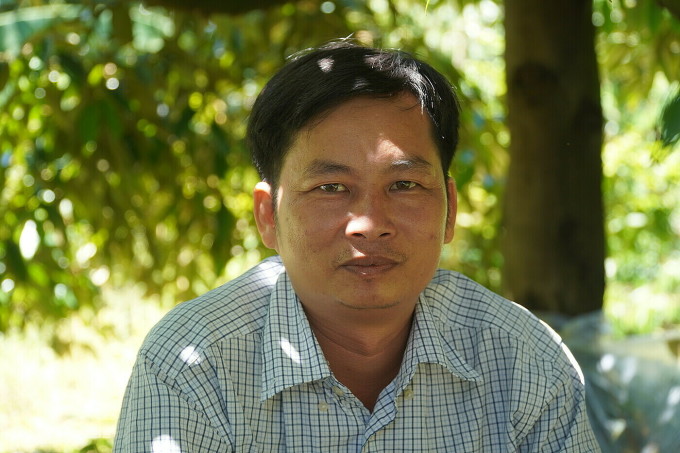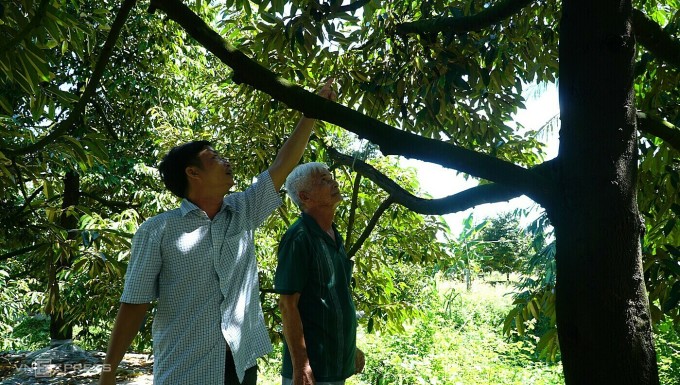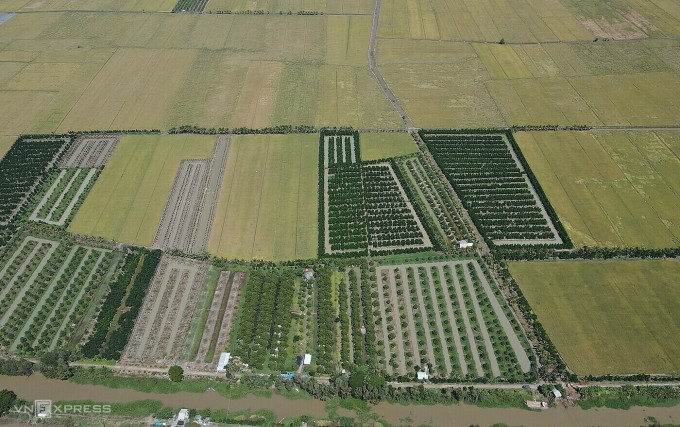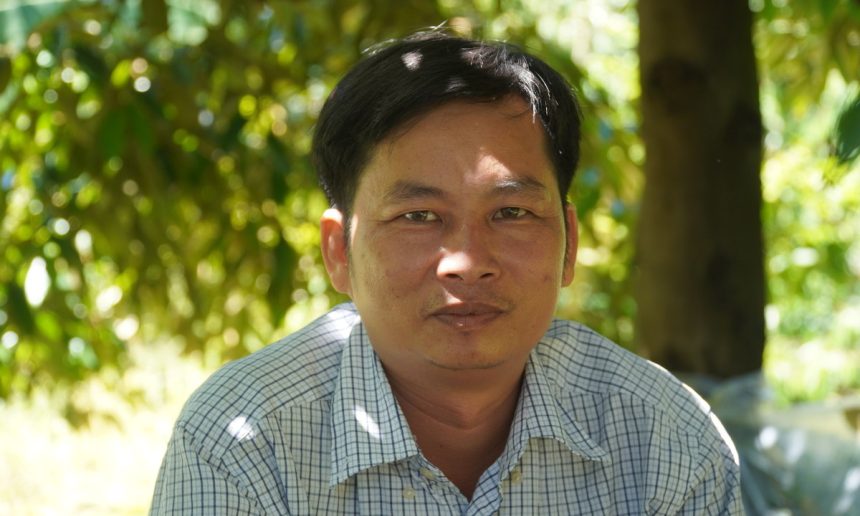Dong ThapGrowing durian on heavily acidic soil in Tam Nong district, Nguyen Thanh Tam, 39 years old, was considered by many people to be a “crazy engineer”, but he succeeded.
In 2009, Tam graduated as an agricultural engineer, majoring in aquatic diseases. After three years as a teaching assistant at Can Tho University, he decided to quit his job and turn to business. Initially, the young man from Tram Chim town invested in ornamental fish farms and fingerlings, then worked for companies specializing in aquatic medicine.
In early 2018, Tam was taken by a close friend to visit the durian capital in Cai Lay, Tien Giang province. Learning and knowing that many farmers have become rich and have a living from durian trees, he sparked the idea of ”starting a business” with this plant right on his family’s 1.2 hectare field that was severely affected by alum.
“At that time, knowing that I intended to grow durian on the ‘dead field’ until the papayas did not even bear fruit, many people cursed me as a crazy engineer,” Tam said.

Agricultural engineer Nguyen Thanh Tam on a durian garden in Tram Chim town, Tam Nong district, Dong Thap province. Image: Ngoc Tai
Before mass planting, Tam carefully took some soil from the garden and brought it to Can Tho to test its physical and chemical properties. The results showed that the soil is heavily acidic, pH below 4, high compaction, and poor in nutrients. However, there is a bright spot: the soil is rich in silicon (an ingredient found in clay) – a factor that helps durian rice become golden and smooth.
Applying the knowledge he has learned and accumulated experience, Tam is determined to renovate the ‘killing fields’ to grow durian. Initially, the young engineer used phosphate fertilizer to wash away alum. Rock phosphate only dissolves when it meets alum soil or substances secreted from tree roots.
“Powdered phosphate easily dissolves in water and washes away, making it expensive to use while rock phosphate is used slowly,” Tam said, adding that plant roots when exposed to alum will be “crippled” and unable to absorb nutrients. Phosphorus has an antagonistic effect on alum, creating a protective film for plant roots.
To increase nutrients for garden soil, Tam uses organic fertilizers to create soil porosity and at the same time develop beneficial organisms and soil colloids (small sized soil particles that retain water and maintain structure). earth bamboo). These beneficial ingredients help break down indigestible nutrients into digestible substances that the plant can absorb. In the first 3.5 years, the 1.2 hectare durian garden used up to 70 tons of self-composted organic fertilizer.

Tam’s garden became a place to share durian growing experience with many farmers in the area. Image: Ngoc Tai
The land of Tam Nong is windy, causing trees to fall easily, so Tam absolutely does not use growth stimulants but lets the trees grow naturally with the motto “short, strong, strong”. At the same time, trees are “trained” from a young age with the wind, without being tied with strings or tree braces, so that they increase their resistance.
According to engineer Tam, although trees cannot speak, they have their own way of expressing themselves. When there is too much nitrogen, the plant will leak pus, and if there is a lack of phosphorus, the leaves will turn yellow. The tree bears too many fruits and the fruit will grow slowly. “Durian is very difficult to grow, you have to understand its characteristics. This is also a tree for rich people, you have to feed it continuously, if you starve it will make them sick. Treating the disease costs many times more,” Mr. Tam said.
After 3.5 years of planting, on average each durian tree costs 12 million VND (equivalent to 2 billion VND for 1.2 hectares) higher than other places due to high costs of land improvement, but after only 4 crops for fruit, the garden owner said he took capital and profit from 0.5 to 1.5 billion VND per year, depending on the selling price.
“Tam Nong’s alum soil can completely grow durian, silicon in the soil really makes durian rice golden and more delicious,” Tam believes that what to plant is not as important as constantly learning about it and persevering with it, don’t Hastily planted and then cut down just because the selling price goes up and down.

The model of growing durian on alkaline soil was followed by many farmers after engineer Tam successfully tested it. Image: Ngoc Tai
Not keeping his knowledge to himself, after a successful testing process, Tam shared the knowledge he had with his brothers in the Tram Chim town durian club. In it, he repeatedly emphasized the need to clearly understand soil characteristics, the “eating” habits of plants, and not overuse chemical fertilizers, which are both ineffective and cause plants to shorten their lifespan. Currently, the club has more than 30 members, Tam was trusted and elected as the vice-leader.
Mr. Nguyen Anh Tau, Deputy Department of Agriculture and Rural Development of Tam Nong district, said that through the durian club, engineer Tam has shared a lot of knowledge about durian growing with people in the area.
With testing and success with the model of growing durian on alkaline soil, engineer Tam has opened a new direction for households with little arable land. Currently, the whole district has more than 100 hectares of durian trees. The locality only encourages people to plant in dike areas for three crops, avoiding expansion in areas at risk of flooding.
“Tam is the leader in growing durian in the district, and also understands the techniques and applications of organic fertilizers to replace inorganic fertilizers. Initially, the model has proven effective in terms of yield and fruit quality,” Mr. Tau said.
Ngoc Tai



